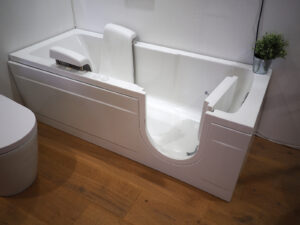What Types of Home Modifications Can Help Your Senior to Be Safer?

Home Care in South River NJ
Keeping your elderly family member safe in her home can feel like a big task because it definitely is. It helps a great deal if you break down this massive undertaking into smaller bits. Get a big picture idea of how your senior’s home is set up for safety initially and then start tackling individual areas of concern. It can also help to have another set of eyes on the situation.
Go through the Whole House for Starters
When you’re ready to see what changes need to be made in your senior’s home, first do a complete walkthrough of the entire house. Is there loose carpeting or slippery flooring? Are there a lot of electrical cords crossing pathways? Is the lighting too dim overall or are there a lot of burned-out bulbs? Addressing these issues first helps you to get a head start on safety so you can tackle other items as you find them.
Deal with Stair Safety
If your elderly family member’s home has stairs, you need to be extra careful with them. Make sure that existing handrails are secure or replace them with sturdier versions. Determine if there is a way to avoid the stairs, if necessary. One popular solution is to move your senior’s bedroom down to the main floor of the house, keeping her from having to use the stairs at all. If that is not possible, hiring home care providers to assist with mobility is also a good idea.
Lighting Solutions Are Also Important
Once you’ve addressed burned-out bulbs or dim lighting, you might realize you have bigger concerns when it comes to keeping your senior’s home well-lit. Using motion-sensing lights can be helpful, both in terms of allowing your senior to automatically have the light that she needs, and also helping home care providers. If they don’t have to focus on finding light switches, it’s easier for them to assist your senior with mobility and other concerns.
Determine if Entryways Are Safe
Entry and exit points for your senior’s home are also important to examine more closely. If your senior can’t safely maneuver onto the porch, for instance, that’s dangerous whenever she needs to leave or come home. Adding a ramp can solve problems around stairs, but you might need to be more creative if the entryway is too small.
Focus on Specific Issues in Certain Rooms
Certain rooms have a bit of a reputation when it comes to safety. The most common rooms on that list include both the bathroom and the kitchen. You’re going to want to look at solutions like installing grab bars, adding non-slip flooring options, and moving heavier items to lower shelves. Rearranging these rooms can also help make sure your elderly family member can easily access the items she uses most often.
Home care providers can help you and your senior to stay on top of safety concerns in her home. They’re familiar with the unique needs of aging adults, which can help you to feel more secure about your senior’s living situation.
If you or an aging loved one is considering home care in South River, NJ, please contact the caring staff at Care Street Home Care today. Call (732) 607-8870.
- Signs Your Senior Parent Needs Home Care Assistance - January 17, 2025
- Hearing Rehabilitation: Empowering Seniors for Better Living - January 10, 2025
- Understanding How Cartilage Changes Over the Years - January 3, 2025
